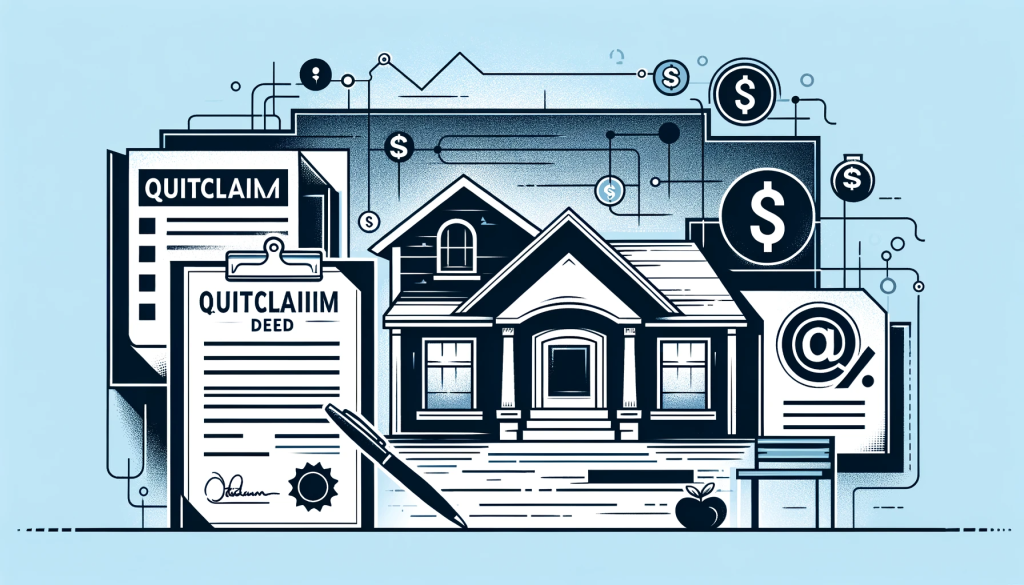
A contract for deed sale can present a convenient alternative to the traditional real estate conveyance. In this owner-financed deal, the buyer usually lives on the property upon the execution of the contract. While enjoying the property, the buyer pays for it in monthly installments, until the agreed-upon price has been paid in full.
Down the road, when full payment is complete, the purchaser formally acquires the title deed. This event occurs through a warranty deed, which guarantees that the seller is the sole party with any claim on the property to be conveyed – no exceptions, unless stated on the deed.
If things don’t go as planned, and the buyer defaults, recovery of the property can be a time-consuming process. Defaults happen, so a seller should consider having the buyer sign a quitclaim deed as part of the execution of the contract. A quitclaim is a non-warranty deed. It conveys property with no warranty for the title. Through this document, if it becomes needed, the buyer will relinquish any claim on the property.
Here, we look at how the contract for deed sale works, and briefly examine the function of the quitclaim deed.
Win-Win: Benefits of the Contract for Deed Sale
When a mortgage loan doesn’t suit a buyer, the seller may offer financing in the form of a contract for deed sale. This written contract between the parties represents their agreement to convey the property upon meeting the contract’s terms.
The contract for deed sale can present a win-win agreement.
- Sellers may gain a steady source of income from a property where a buyer is willing to pay the price plus interest in installments. Owner financing serves as a useful way to expand a real estate investment portfolio.
- The seller can avoid receiving a large payment with heavy tax ramifications.
- The buyer usually benefits from a relatively low down payment. The buyer also builds up an equitable claim through a contract for deed. (Under prevailing case law, while the seller keeps a security title, the buyer becomes the property’s equitable owner.)
Owner financing is relatively fast and cost-effective. It circumvents the closing costs and various fees associated with the traditional mortgage. It averts the need for appraisal and inspection costs. And with owner financing, there’s no institutional loan. No bank wields control over the financing.
When a Buyer Defaults: How the Quitclaim Deed Fits In
Usually, a contract for owner financing contains no acceleration provision, so the defaulting buyer is not suddenly responsible for the full balance. The buyer has a brief window of time to bring payments up to date and hold onto equity in the property.
Yet many owner-financed sales have historically included balloon loan provisions, with the buyer expected to be ready with a large payment in five to seven years. When it becomes necessary for the seller to cancel the contract, the seller may take back the property (including any improvements made by the buyer).
Moreover, because the seller keeps legal title to the parcel up until the time the buyer pays off the full contract price, it’s the buyer who risks losing the payments already made on the contract – plus taxes and insurance costs.
Getting the property back can be difficult and time-consuming for the seller, but can be eased if the buyer signed a quitclaim deed as part of the execution of the contract. This use of the quitclaim deed is not uncommon, especially when the transaction involves friends, business partners, or divorcing couples. If the parties’ contract provides for foreclosure upon default, and the buyer has signed a quitclaim deed, the transfer of the home back to the seller can occur without voiding the underlying contract.
Does the quitclaim deed enable a seller to take legal action to recover any money lost to a deadbeat buyer? It depends. State law may restrict a seller’s ability to recover damages from buyers in foreclosure. Some states allow damages for the seller in a contract for deed, but no remedy for outstanding debt.
Neither the courts’ permission nor a foreclosure sale is required in the cancellation of contracts for deed. And if the defaulting buyer owes more than the property’s market value, the seller may take legal action against the buyer for breach of contract. In this fashion, the seller can ultimately regain what the buyer owes in back payments.
In Sum: Prepare a Quitclaim Deed at the Contract’s Execution; Use a Warranty Deed When the Contract Is Completed
Owner financing can be a helpful option for a property with no outstanding mortgage – perhaps a home that has provided a source of rental income over the years, or a home that’s lingering on the market and needs some creative planning to sell.
Overall, owner financing can be an excellent way to augment a property owner’s income. It’s relatively quick. When underwriters rule out potential buyers who have recent employment changes or other barriers to the traditional mortgage loan approval, owner financing offers a workaround.
Possible default is the main risk in this approach. Yet a quitclaim deed, signed at the very beginning and retained, eases the home’s return to the seller if necessary.
The warranty deed is the standard document, appropriate at the completion of a contract for deed sale. At execution, a pre-signed quitclaim deed can prove helpful in risk management.
